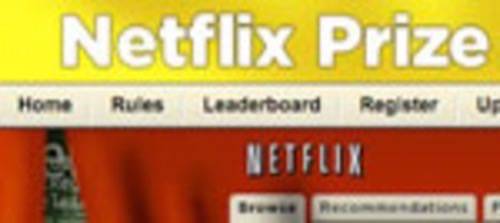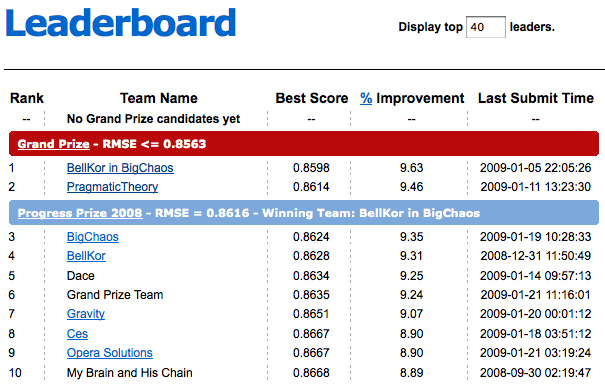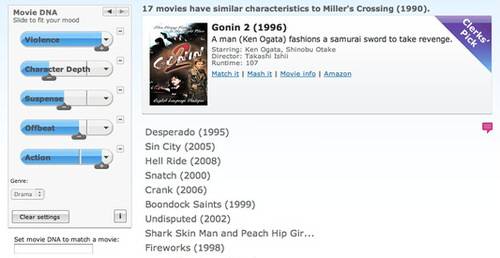We’re starting a new series here on ReadWriteWeb about recommendation engines. We identified recommendations as one of 5 trends to watch at the start of 2008; and that’s even more so at the beginning of 2009. We also have a page dedicated to recommendation technologies in our stock presentation entitled What’s Next on the Web?. In this post we look at Netflix; and in particular update you on the $1 million challenge that Netflix set in order to find ‘the next big thing’ in recommendations.

Quick Refresher on Recommendation Technologies
Before we check in with the Netflix Prize, let’s refresh our knowledge of recommendations technology as it pertains to the Web. Basically the idea is that given a set of ratings for a particular user, along with those of the whole user base, a recommendation system will come up with new items that the user may like. Personalization is the driving force behind this, because the more new things a retailer or service can offer a user, the more chance the user will buy / like them.
In his influential post of 2 years ago, The Art, Science and Business of Recommendation Engines, Alex Iskold suggested 4 approaches to recommendations:
- Personalized recommendation – recommend things based on the individual’s past behavior
- Social recommendation – recommend things based on the past behavior of similar users
- Item recommendation – recommend things based on the item itself
- A combination of the three approaches above
The two Internet companies that have been most prominent in using recommendations are Amazon.com and Netflix. Others, such as Google, have used it as well – but more as a background enabling technology.
Netflix Prize
The Netflix Prize is a competition that Netflix – the U.S. online movie rental service – began on October 2, 2006. Its aim is to “substantially improve the accuracy of predictions about how much someone is going to love a movie based on their movie preferences.” A prize of $1,0000,000 was put up by Netflix for a third party to come up with a collaborative filtering algorithm that will improve Netflix’s own recommendations algorithm (called Cinematch) by a baseline of 10%. The contest has been going for over 2 years now, with no grand prize winner yet. However the latest leaderboard shows that a group called BellKor in BigChaos is closing in on the magical 10% – as of writing they are at 9.63. There are currently 7 competitors who have gone over 9%, the second best being PragmaticTheory with 9.46%.

BellKor in BigChaos is a partnership between a group of current and ex AT&T researchers (two of them still working at AT&T Labs in New Jersey) and a company called Commendo Research from Austria. They were the recipient’s of Netflix’s 2008 Progress Prize, with a 9.44% improvement over Netflix’s Cinematch algorithm. Netflix is awarding a $50,000 progress prize every year until the 10% goal is met.
The New York Times had an extensive profile of the Netflix Prize in November. The piece notes that Netflix’s current algorithm, Cinematch, was introduced in 2000 and has since gone on to be a driver for 60% of Netflix’s rentals. What’s more, it’s also a boon for The Long Tail, because as NYT stated “it also often steers a customer’s attention away from big-grossing hits toward smaller, independent movies.” 70% of what Netflix customers order are from the long tail – “older movies or small, independent ones.” In 2006, Netflix noted that Cinematch’s improving performance had plateaued. So it released data for third parties to try and come up with improvements to Netflix’s own recommendation engine. As of November 2008, the data was made up of 17,770 movies with ratings by 480,189 users.
Netflix is also busy on other fronts to tap into ‘the wisdom of the crowds’ – in late September 2008 it released its much anticipated API, available at developer.netflix.com. An example of the type of application this may encourage is Feedflix, a third party app that we profiled last April. It offers a variety of useful data that may help Netflix users select better movies.

Will the 10% Mark be Reached in 2009?
It’s difficult to say whether the $1M Netflix Prize will be finally won in 2009. On the positive side, the current leader is only 0.37% away from claiming the prize. The NYT article suggested that the top 10 on the leaderboard all use very similar mathematical theories (“singular value decomposition” being the main one) and that differences between the teams are merely “tweaks”. There’s a sense though that to reach the magical 10% mark will require a breakthrough, rather than continued incremental improvements. The problem appears to be eccentric movies, the type that people either love or hate – such as Napoleon Dynamite. According to NYT, “a small group of mainly independent movies represents more than half of the remaining errors in the way of winning the prize”.
Some people think that the 10% ceiling will not be reached using algorithms. ClerkDogs is a service that we profiled in December and its approach is to hire real-life former video store clerks to “create a database that is much richer and deeper than the collaborative filtering engines.” In other words, it’s the opposite principle to what Netflix is trying to do with computer algorithms. Founder Stuart Skorman thinks that the Netflix algorithmic approach to matchmaking has reached a ceiling; and that the only thing left to do is bring humans into the equation. He says it’s a similar approach to Pandora, which has 50 employees who listen to songs and tag them. Skorman knows a thing or two about the online movie rental industry, having founded Reel.com in the mid-90s and sold it 3 years later for $100 million to Hollywood Entertainment.


We hope the prize is claimed this year, as a 10% increase in recommendation effectiveness on Netflix is a big improvement that will benefit consumers. But we also think the human element that ClerkDogs is advocating will be an essential piece of the puzzle going forward – expert human content is always the most valuable, although it generally costs more too. Perhaps Netflix will end up buying ClerkDogs? That would be an interesting mashup!
ReadWriteWeb Resources for Recommendation Technologies
We will be profiling other recommendation companies in upcoming posts. We also invite you to explore using our custom ReadWriteWeb Resources:
- RWW Recommendation Industry Feed Favorites OPML file (save link)
- RWW Recommendation Industry Feeds – Best of Feed (copy and paste to your reader)
- Click to preview the above feeds before subscribing (pop-up window)
- RWW Recommendation Site Search (Visit and Bookmark)










